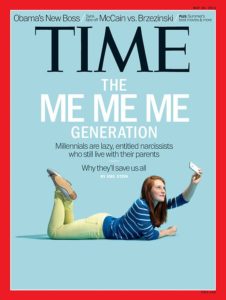Happy Millennials = Happy Workplace
0 comment
Malcolm Harris, a millennial author of an upcoming book on millennials, declares in a recent Washington Post op-ed, that it should come as no surprise that millennials are leakers like no other previous generation. While some folks question Harris’ stability (particularly since the tweets he posted after yesterday’s shooting at the Republican baseball team’s practice, and then deleted, though many of his other tweets and writings are deserving of raised eyebrows and questions of civility), and others refer to him as communist, the argument he puts forth in the Post piece is hard to discredit. And though most nonprofits don’t have trade secrets to be leaked or secrets that if leaked would threaten the security of the United States, the logic of his argument as to why recent leakers have been millennials deserves the consideration of anyone involved in running a workplace.
His argument is simple and builds from what the research shows to be true of millennials: he notes that millennials have been raised to be independent, free-thinking individuals who don’t like being told what to do or being circumscribed; they want to be their own bosses. They are proactive and have an essential need to be true to themselves, to be their “authentic selves” and if things aren’t going as they want them to, they will change that. For understanding why millennials are leakers, Harris adds to the above that millennials don’t like to wait for change. Thus, those with access to secret information they see as offensive aren’t going to sit back and wait for the political system—a system that many don’t trust—to try and change things, they aren’t going to wait for the next election to foment change, they are going to leak. And no one, Harris says—the government or an employer—can count on millennial loyalty unless they have earned it.
And this brings us to the lessons for nonprofits. Harris cites a Bentley University study of college-educated millennials that found that these millennials won’t “tolerate unpleasant workplaces,” defined as those that squash that authentic self of theirs. Such an unpleasant place might be a workplace that doesn’t support professional development, have opportunities for employee growth and promotion and other things that allow millennials to achieve their ultimate goal: being the boss, and being the boss as quickly as possible. Given how few nonprofits really support and engage in the professional development of their employees and how few have organizational charts deep enough to allow for career growth and opportunities to be a boss, nonprofits could be in for tough times when it comes to employees. We know that the proclivity of millennials isn’t to seek the proverbial 30-year watch, but to work until they are bored, become uninspired, recognize they aren’t welcome, and/or feel thwarted, leading to a pattern of sequential new job and departure, new job and departure, etc.
While some turnover in an organization is valuable, so is continuity, recognizing that continuity isn’t a lifetime commitment. But a balance of both in an organization definitely has its benefit. Thus, nonprofits must identify what they can and should be doing to extend the tenure of their millennial employees. Here are a few options.
- Professional development is an easy one, as this is “perk” that appeals to all generations of employees. Thus, nonprofits must get over their “fear” (or excuse) that paying for professional development of their employee today will benefit another nonprofit tomorrow. Even if that’s ultimately true, in the meantime that nonprofit gets another year or two of service from those millennials.
- Re-jigger the organizational chart to provide more tiers and, thus, more room for advancement.
- Investigate, or, better yet, try using shared leadership in some places in the organization, thereby allowing millennials to achieve sooner than they might otherwise their big desire: to be a boss. Millennials want to be a boss even if they can admit they don’t yet have all that is needed, and shared leadership can well temper the lack of readiness. For example, shared leadership that is between a boomer and millennial may be shared leadership with a built in bonus–mentoring, though it may also be fraught with clashes of styles. And, given that shared leadership is best achieved when the co-leaders complement one anther’s strengths and fill in the gaps, two underprepared millennials may make one prepared leader.
- Engage in cross-training, always good for any organization, but particularly small ones, which so many nonprofits are, and good for all employees as they learn new skills and expand their repertoire.
While nonprofits don’t have to worry about leakers, we do need to be sure we are creating a workplace that not only attracts millennials, but one that can keep them happy, challenged and valued for as long as possible.
NOTE: Look for our new class on “generational dynamics in the workplace” on April 17, 2018.
The opinions expressed in Nonprofit University Blog are those of writer and do not necessarily reflect the opinion of La Salle University or any other institution or individual.

